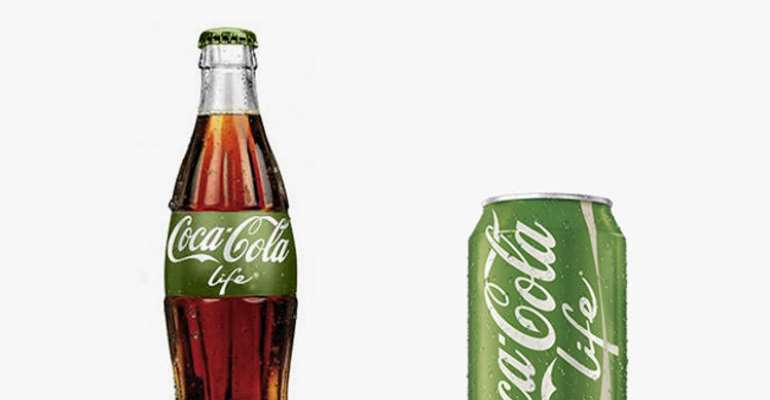Coke's new low-cal, low-sugar soda is designed to quiet critics

In the central lobby of the Coca-Cola museum in Atlanta, a glass display case features all the types of carbonated drinks currently sold by the company. There's the classic red can and its no-calorie iterations: Diet Coke and Coke Zero. Then there's Sprite, Fresca, and the citrus rainbow that is Fanta. Over on the left is a small green can that most American visitors won't recognize: Coca-Cola Life, a stevia-sweetened version of regular Coca-Cola. Coca-Cola has been quietly test-marketing its new beverage, the first addition to the trademark “Coke” branded sodas in almost eight years. It released the drink in Argentina and Chile last year, and this fall it's launching in the U.K.
Coke Life isn't exactly a diet drink. According to the Guardian , it contains more than four tablespoons of real sugar and has about 89 calories per can—less than the 140 calories found in a can of regular Coke, but hardly something that will be championed by the quinoa crowd.
Instead, Coke Life is Coca-Cola's answer to the two health concerns that have been hitting the company's soda sales with a one-two punch: the anti-sugar movement, which rails against its full-calorie, full-sugar line of beverages, and the perception that artificial sweeteners such as aspartame (found in both Diet Coke and Coke Zero) are unhealthy and can even contribute to weight gain.
These concerns have contributed to a steady nine-year decline in U.S. soda sales. Last year they slid even further—dropping 3 percent, or more than double the 1.2 percent they'd fallen the year before. (Soda is already down a further 2 percent this year.) Diet soda sales withstood the decline for a while; now they appear to be tumbling, too. Last year, Diet Coke sales in the U.S. dropped nearly 7 percent, according to Beverage Digest .
As soda sales have fallen, Coke has also found itself fending off health-policy experts and state governments pushing for increased regulation of sugary drinks and snacks. New York City's limit on soda container sizes is currently making its way through state courts, and a California law that would add a warning label to cans saying, “Drinking beverages with added sugar(s) contributes to obesity, diabetes, and tooth decay” has made it through the state senate, despite heavy lobbying by the local arm of the American Beverage Association (of which Coca-Cola and PepsiCo are members). In the U.K., where Coke Life will make its next debut, Coca-Cola has agreed to reduce the average calories in its sodas by 5 percent by the end of this year.
Coca-Cola has more than 100 years of experience fighting health crazes and government regulation campaigns. In 1906 the U.S. government sued the company in attempt to get it to abandon caffeine. (It lost.) In 1950, a Cornell professor named Clive McCay testified before a Congressional committee on food additives that Coke could eat through teeth. ( Not true. ) But so many drink choices are now available that Americans' current move away from soda doesn't appear to be temporary.
Coca-Cola's chairman and Chief Executive Officer Muhtar Kent has publicly committed the company to getting them back. “We believe in the North American market. We believe in the demographics, we believe this is a growth market,” he told investors during the fourth-quarter earnings call in February. The company is doubling down on its carbonated soda line and is in the midst of a $1 billion advertising push. Its current World Cup campaign, which heavily focuses on the classic Coca-Cola brand, is the most expensive, all-encompassing marketing campaign in the company's history. It won't disclose how much that is, but the Wall Street Journal put the figure at around $600 million .
At the moment, Coke Life doesn't have a U.S. debut date. Given the company's heavy investment in stevia-based drinks—in 2007, Coca-Cola and Cargill teamed up to create Truvia, a consumer brand of stevia sweetener—it seems likely that the drink will soon see much wider release. Stevia is now found in drinks ranging from Vitaminwater to some Odwalla varieties; according to Truvia, the stevia category has grown 20 percent since 2008. Meanwhile, PepsiCo is going a different route. It's working with San Diego-based biotech company Senomyx to create an additive that would trick people's taste buds into detecting more sugar than exists.
Business week
